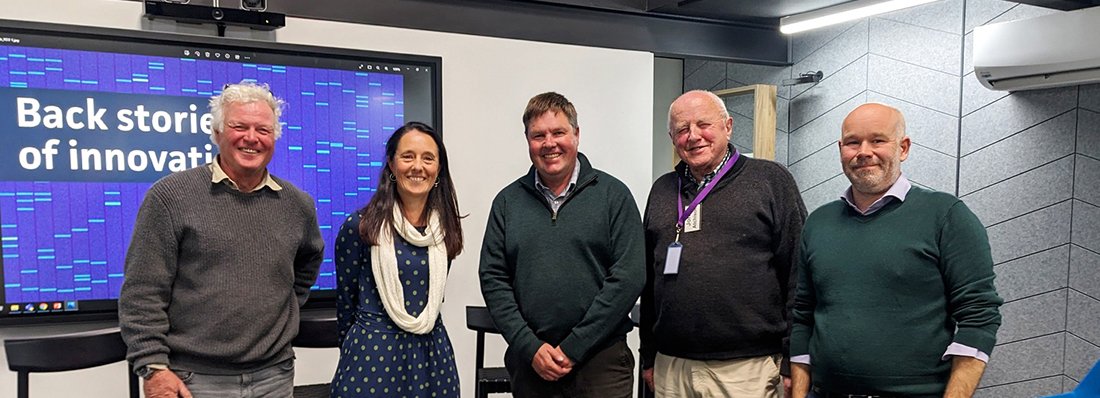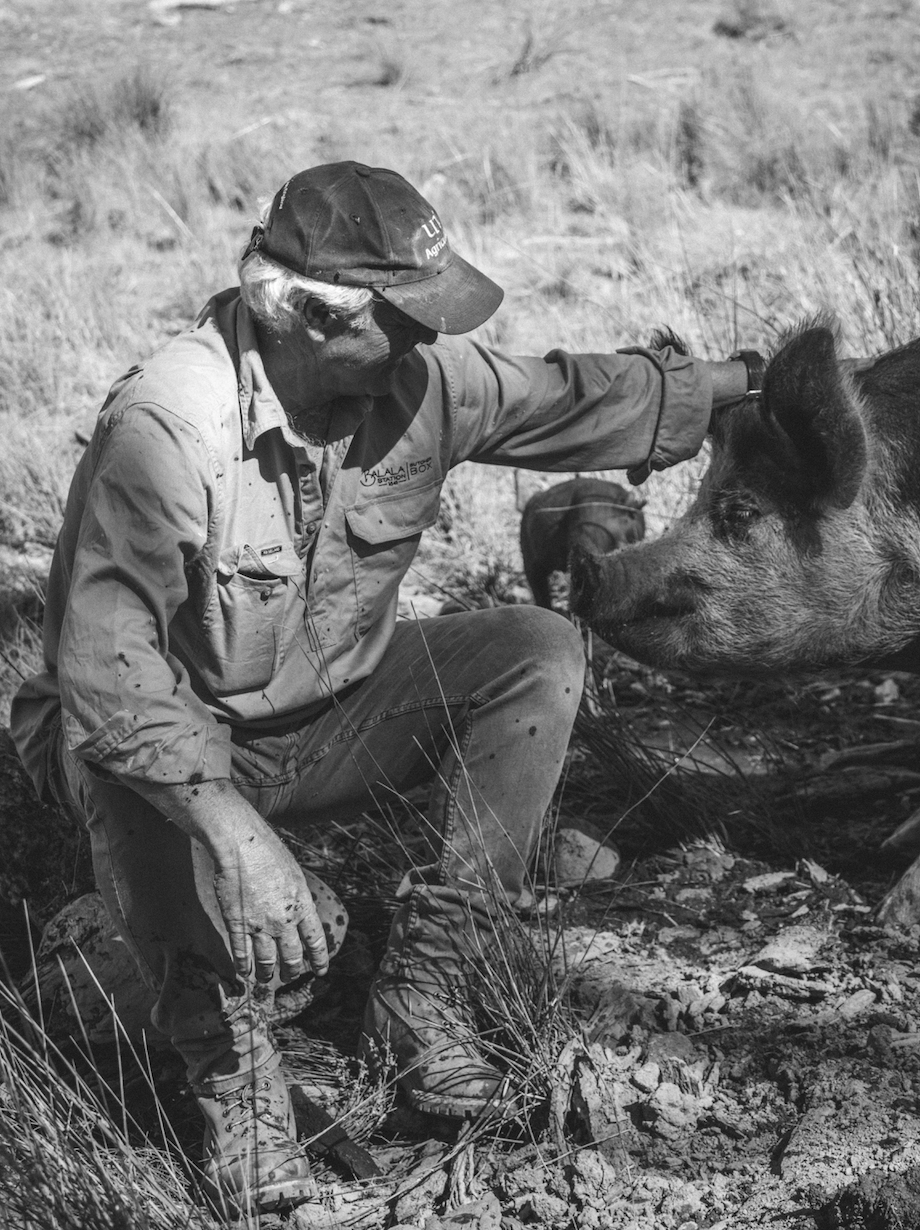UNE SRI Back Stories of Innovation
The UNE SMART Region Incubator (SRI) celebrated its two-year anniversary at NOVA, a vibrant co-working space fostering innovation. The community commemorated with a public event, December 2023, launching Faces of Back Stories 2023, a photographic project spotlighting local businesses featured in the Back Stories of Innovation event series. The event presented a number of speakers highlighting the region's rich history of innovation and connectedness, and emphasizing NOVA's role as a hub for ideas and collaboration.
Richard Daugherty, Owner/Operator of Balala Station, was granted the opportunity to speak on the shift from industrial farming to regenerative practices. Drawing inspiration from sustainability visionaries, he called for community engagement and consumer awareness to propel the transition towards a sustainable future. Full transcript below.
____________________________
I ask myself, ‘what’s innovative’ or smart about what we’re doing? I seem to just scratch around in the dirt like a chook trying to make it work.
But having a context / mission statement in one’s life as to what it is that one is moving towards, rights the ship and a course is steered. (for every action there is an equal and opposite reaction)
Being offered to talk about the innovative ways as a Protein Maker led me to think how different or new am I doing what I am trying to do.
One breeds an animal which grows through the intake of grass food energy as quickly as possible from start to finish it is then sold and processed for a return determined for you and viola, that’s farming. As it is said, farmers are stewards of the land but really is this for the greatest return they can make within the parameters set for them from the land, climate, market forces OR is it being done to align with their context statement.
As written in the brief: by definition, ‘innovation’ is a new idea, device, or method. It’s born out of ingenuity, passion and a desire to make things better. By nature, innovation is also intrinsically connected to ‘the future’ and as a result, we often dismiss the past as lacking relevance; being “the old way”. But could we be missing something?
What can we learn from the past to help us into the future? Innovation has always existed, so, of course we can learn from those who previously invented, created, adapted and pivoted.
Through that lense, farming now looks very different. In the past it connected, bound, delivered food to communities and it was all tied together. There was an empathy for the land, mother nature was such an integral part of this functioning intertwined circle.
Farming practices such as organic, bio dynamic and holistic, were based on principles like 'dynamism', which is drawn from the belief that everything that is alive is a process undergoing a constant transformation – Rudolf Steiner 1924, or 'Holism’ which is the notion of understanding that what you influence in one place has an impact on everything else. To put it slightly differently there are no independent variables – General Jan Smuts: Holism and Evolution in the 1930’s
Agriculture and farming moved away from this after WW2 into the industrial age of agriculture with the advent of Chemical fertiliser. There is now a change happening and a desire to do better, so Regenerative has filled this space, taking on the principles of the past. But really Regenerative it is just a word – adopting practise is the key.
But I am not here to talk about these nuances, rather that Balala Butcher Box was floated as an idea because the systems in which farming operated were broken and new ways need to be developed, that tie principles of practice and systems together.
The mind shift that, not only does one produce a commodity, but rather, food, happened. This was so eloquently put in an interview I listened to with Richard Fidler talking to William Sitwell (an English food writer and author) on Conversations. He described food as the greatest subject – it is about culture, politics, health, poverty, life, economics, misery, fun, frivolity, happiness, seriousness, hospitality – it is limitless.
Suddenly being a farmer was so much more than scratching in the dirt like a chook trying to make ends meet, and the pivot happened.
So my quick elevator pitch was:
Balala Butcher Box is to supply ethically raised nutrient dense and diverse protein to conscious consumers who want to be part of the solution, closing the loop where best practise is undertaken by the producer and supported by the consumer. No different from how it was always done in the past.
New England, Armidale and surrounds, in its past was a thriving rural centre with abattoirs, flour mills, tanneries and breweries all supplying a connected community. Then came the railway line and it started to change. Inputs could be brought in cheaper and economies of scale played its part. With that, this core of industry couldn’t compete, and closed.
For the last couple of decades, and not specific to Armidale but generally across Australia, small abattoirs have closed, and the industry is now controlled by a handful of conglomerates. Maybe State Authorities had a play in this demise under the auspice of food safety, as the staff were then required to monitor a larger number of facilities – or perhaps not, but either way, they closed. I was only recently listening to a podcast, The RegenNarration with Anthony James on a micro abattoir set up in South East WA, Southampton Homestead. The owner, Jeff Pow, was mentioning that it was only a few decades prior, there were 54 small abattoirs in his region, all have since closed. Now the area is re-connected, farmers are co-oping together and service kills (processing of livestock) are being done for neighbours and their region. Though their abattoir does 20,000 chickens a year instead of the 20,000 a day that the industrial abattoirs achieve.
Another large issue is that these multi national abattoirs choose not to do service kills – farmers aren’t connected – it all becomes a commodity, and thus produce needs to go through the chain to end up on your plate.
There was an article in the ABC Rural in 2019 : 'How mass production lines, the invention of refrigeration and food safety changed the way we eat meat.'
That was the birth of the large abattoirs, but it is interesting now because community expectations about meat processing and animal welfare are changing, with growing concerns about transparency in these abattoirs.
Consumers will effect this change through demand for provenance and what is right for the animal. The same has occurred with certain practises in the wool industry. It is off this bat, plus farmers wanting to take whole-of-line control of their food product, that the economic model is starting to change, because the old way, will break the smaller farmers and producers. The number of producer groups starting to effect change is very enlightening.
So for the New England, leadership is required to create co-operatives, community engagement and new pathways for a connected, tangible understanding of product and food. A sense of place – a proudness to be a rural community.
But could we be missing something? What can we learn from the past to help us into the future?
We all need to play our role in this space. It is far too important, not to be involved. We as a society have pushed the envelope to the extreme brink and we are now on the edge of it. We may have moved from the Holocene epoch which began some 11,700 years ago after the last ice age, into the unofficial Anthropocene epoch (used to describe the most recent period in Earth’s history when human activity started to have a significant impact on the planet’s climate and ecosystems). This is not something, we as a society, should be proud of - it is now about how we come back from the precipice. It’s our choice, and maybe approaching it from a regional aspect is a possible way to start this change.
From circular economies to community-based systems, our behaviours as a consumer need to change. We need to be more in tune with the energy we use, the food we eat and the fibre we wear – where it comes from and how it is produced. One of the ways we can do that is through our purchasing powers, united community strength.
Sustainable Table have just brought out their report – “Regenerating Investment in Food and Farming: A Roadmap” which is a must-read to begin to understand that change HAS to happen. Issues raised in this report are alarming and real.
Our global economic system is broken. Visionaries like Dr. Kate Raworth, Dr. Amanda Cahill (CEO of The Next Economy, with focus and involvement in rural regional communities), and Dr. Katherine Trebeck (co-founder of the global Wellbeing Economy Alliance) challenge The manner in which we perceive economics, including concepts such as the relentless pursuit of GDP growth and the continual upward trend of performance indicators, and address that there is a different way forward.
A book I’ve recently read, Doughnut Economics by Kate Raworth, stated “humanity’s 21st Century challenge” is to meet the needs of all (social foundation 12) within the means of the planet (Ecological ceilings 9) - where humanity exists in the safe and just space, within the ring of the doughnut, between a social foundation and the earths ecological ceiling. A very enlightening and disturbing read and further honed my focus on a Regenerative and Distributive Economy.
In conclusion, a thought to ponder, as Kate Raworth poses, “what would have happened if Einstein had have pondered how the apple grew, instead of how the apple fell? How different would it all be?" – It is the questions we ask in life.
I am very honoured as a protein maker to have been afforded this opportunity by the SRI and the Back Stories series, to have spoken today, THANK YOU
Richard Daugherty
LEARN MORE ABOUT SRI
“The SRI team and all attendees loved the opportunity to learn more about your work, and very much appreciated learning more about the positive impacts you are making. We are fortunate that you are in our community, and look forward to what’s ahead!”
Cherene Spendelove
Community Engagement Advisor & Regional Connector
UNE SMART Region Incubator (UNE SRI)


